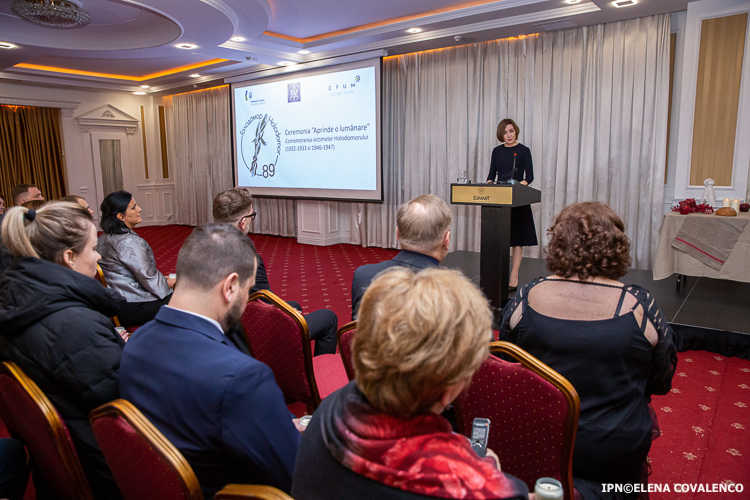The Holodomor, the organized famine, must be talked about in every school, written in every history textbook, memorial plaques with the names of every victim must be made. If we neglect this past, we risk not learning our lessons and ending up with history repeating itself, said Moldovan President Maia Sandu during a ceremony in remembrance of the Holodomor victims.
“For nine months now, Russia has been trying to subjugate the Ukrainian people through the most criminal and terrorist methods. Millions of people have fled their homes and country, millions more are without power and heating with bombs flying overhead. And killing two-day-old children. Has Russia achieved its goal by sowing so much misery? No!” declared Maia Sandu.
The Ukrainian Ambassador to Moldova Marko Shevchenko noted that as a result of the Holodomor organized by the Soviet authorities, at least four million Ukrainians died, and the experienced horrors left their mark on several generations of Ukrainians. “Absolutely unpredictably, even 90 years after the organized famine against Ukrainians, genocidal methods in the form of Russia’s full-scale war against Ukraine are still being used, which has demonstrated that Russia once again wants to destroy the Ukrainian nation, identity, culture and language”.
According to the ambassador, the Russian attacks on critical infrastructure are an attempt to freeze Ukrainians and force them to flee abroad. Almost five million Ukrainians have already left the country. Moldova is also feeling the consequences of these attacks. “I have no doubt that all the criminal plans of the aggressor will fail. Unlike in the 1930s, when Western governments preferred to keep silent about the Holodomor, today Ukraine has the support of the entire civilized world”, he concluded.
Today the Holodomor is recognized as a genocide of the Ukrainian people by 23 countries of the world, including the U.S. and Canada, but also as a crime against humanity by the Parliamentary Assembly of the Council of Europe and the European Parliament.
- The conditions for EU accession reflect the expectations of Moldovan citizens, states the EU am
- Veronica Mihailov-Moraru, from minister to presidential advisor in justice
- The EU has approved the 19th package of sanctions against Russia
- The President of the European Parliament, Roberta Metsola, is coming to Chisinau on November 6
- A new position at the CEC, that of the general secretary


